Since June 2021, Karuna-Shechen has been supporting the Calcutta Rescue association in its intervention in the slums of Nonadanga and Canal West in Calcutta, India. This partner organisation was created by Dr. Jack Preger, a pioneer in street medicine, who has dedicated his life to helping people living in extreme poverty.
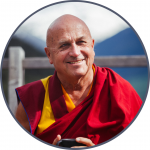
“If we evince more concern for others, we will all act with the view of remedying injustice, discrimination, and poverty”
Matthieu Ricard, Altruism
In the heart of the slums
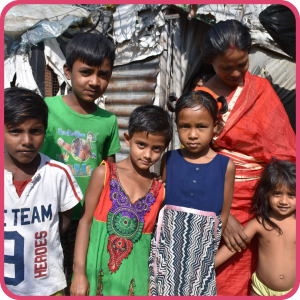
India’s economy is growing rapidly, yet India is still home to a quarter of the world’s poorest people. It is estimated that one-third of Calcutta’s population lives in slums – nearly 5 million people. These people come from generations that have fled the countryside, especially Bihar, to settle in the cities with the hope of finding work and a better life.
Government assistance is improving, but there are still major gaps, especially for the very poor. Calcutta Rescue is working to fill these gaps based on their experience on the ground for over 30 years. They provide health care, access to education, vocational training, social support and sanitation services so that families and entire communities have a chance to escape poverty.
A complicated health situation
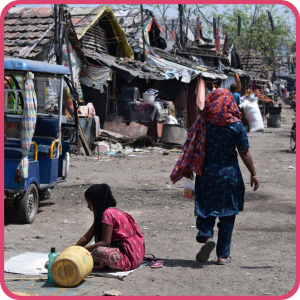
Already very precarious for the poorest people, the health situation in India worsened during the pandemic, with a lack of staff, beds and medicines. The disruption of health services has a direct impact on the fight against other diseases such as tuberculosis and leprosy. A few weeks ago, Karuna teams went to India and visited a mobile clinic of Calcutta Rescue. On the morning of the visit, a case of leprosy was diagnosed, a disease that was supposed to be eradicated in the country in 2005 but which is still spreading severely. Indeed, India is the country most affected by the disease with more than 100,000 new cases each year according to the WHO.
Since 2020, Karuna-Shechen has been involved with associations aligned with our missions and values such as Calcutta Rescue. Together we co-construct innovative and collaborative projects.
Opportunities creatd, lives transformed
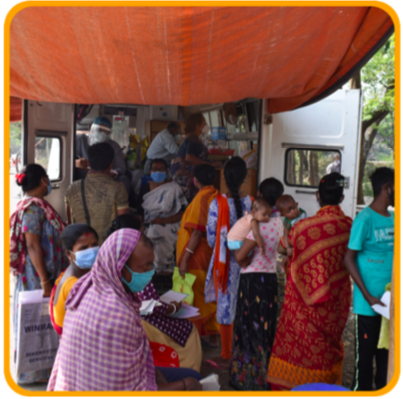
In the slums of Nonadanga and Canal West, the teams of Karuna and Calcutta Rescue aim to improve the health and general well-being of local populations. This includes providing quality medical care, health awareness and healthier lifestyles.
Since the beginning of the project there have been many achievements, such as the construction of toilets and public baths for better hygiene and privacy, the renovation of schools and the monthly distribution of food parcels to the people who live in the slums such as rice, flour and pulses. Wider achievements include the “Street Medicine” program which focuses on the medical and nutritional needs of the inhabitants thanks to mobile clinics that regularly visit the slums.
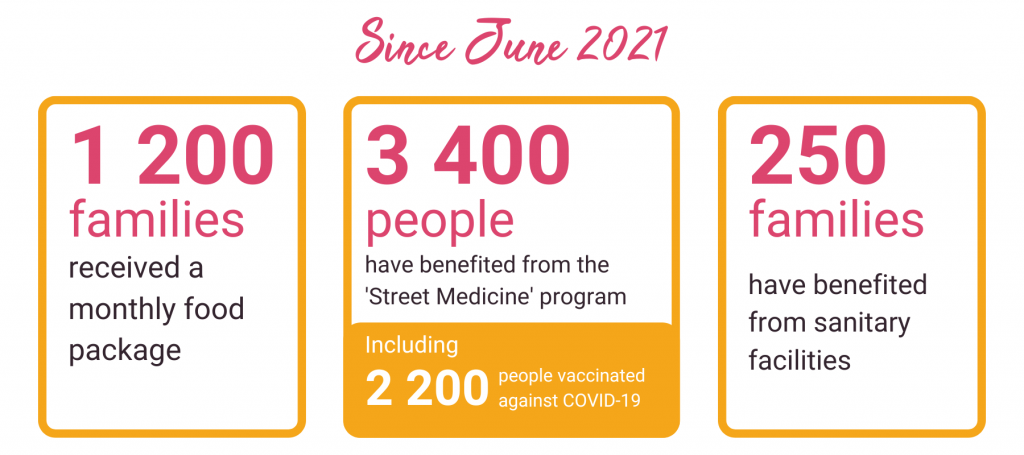
Anjali & Romi share their story
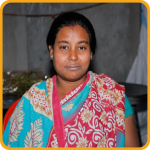
“I live with my husband, my mother-in-law and my two children. Before we didn’t have toilets, we had to go far from home to find a secluded place. Since the public toilets have been installed, everything is much easier. With the other families, we take turns cleaning every week.
My son goes to the local school, before there was no decent school building, the roof was missing and the school was flooded every monsoon. Thanks to the renovation, the children will have no problem learning in the best conditions.” Anjali Mondal, beneficiary
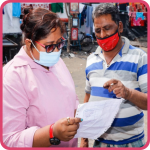
“I have been working at Calcutta Rescue for 5 years and I feel so happy when a patient is healed or when they thank me for the services we provide. Our working conditions are difficult and accentuated by the extreme weather conditions, but this hardly prevents us from doing the necessary work. Thanks to our intervention, pregnant women who used to come to the hospital only at a late stage of pregnancy now know that they should come in the first trimester for the sake of the child. Blood tests for diabetic patients have become regular, children are regularly vaccinated, slum dwellers wash their hands and have better hygiene habits, especially children. All these positive results prove that we can instill good habits in them, and from a young age.” Romi Patra, health supervisor at Calcutta Rescue
